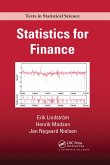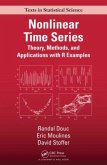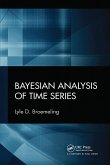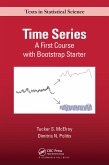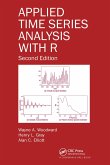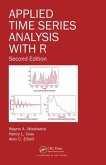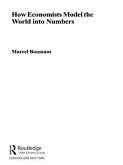Despite the unobserved components model (UCM) having many advantages over more popular forecasting techniques based on regression analysis, exponential smoothing, and ARIMA, the UCM is not well known among practitioners outside the academic community. Time Series Modelling with Unobserved Components rectifies this deficiency by giving a practical overview of the UCM approach, covering some theoretical details, several applications, and the software for implementing UCMs.
The book's first part discusses introductory time series and prediction theory. Unlike most other books on time series, this text includes a chapter on prediction at the beginning because the problem of predicting is not limited to the field of time series analysis.
The second part introduces the UCM, the state space form, and related algorithms. It also provides practical modeling strategies to build and select the UCM that best fits the needs of time series analysts.
The third part presents real-world applications, with a chapter focusing on business cycle analysis and the construction of band-pass filters using UCMs. The book also reviews software packages that offer ready-to-use procedures for UCMs as well as systems popular among statisticians and econometricians that allow general estimation of models in state space form.
This book demonstrates the numerous benefits of using UCMs to model time series data. UCMs are simple to specify, their results are easy to visualize and communicate to non-specialists, and their forecasting performance is competitive. Moreover, various types of outliers can easily be identified, missing values are effortlessly managed, and working contemporaneously with time series observed at different frequencies poses no problem.
The book's first part discusses introductory time series and prediction theory. Unlike most other books on time series, this text includes a chapter on prediction at the beginning because the problem of predicting is not limited to the field of time series analysis.
The second part introduces the UCM, the state space form, and related algorithms. It also provides practical modeling strategies to build and select the UCM that best fits the needs of time series analysts.
The third part presents real-world applications, with a chapter focusing on business cycle analysis and the construction of band-pass filters using UCMs. The book also reviews software packages that offer ready-to-use procedures for UCMs as well as systems popular among statisticians and econometricians that allow general estimation of models in state space form.
This book demonstrates the numerous benefits of using UCMs to model time series data. UCMs are simple to specify, their results are easy to visualize and communicate to non-specialists, and their forecasting performance is competitive. Moreover, various types of outliers can easily be identified, missing values are effortlessly managed, and working contemporaneously with time series observed at different frequencies poses no problem.
"The main contribution of the book relative to existing books on this topic is that it emphasizes the actual model class, rather than methods for these kind of models. The author points out that despite the many advantages of this rich class, its use is still limited among practitioners. He hopes that his new angle will further popularize unobserved component models...the book really achieves its purpose and differentiates itself from alternatives, and is therefore a valuable addition and worth buying. The discussion of software in Chapter 10 is extremely timely and a great plus for practitioners and researchers that are ready to sit down and start implementing. For each software package, clear examples are given on how to run an example unobserved component model...In closing, the book reads well and really provides the reader with a broad understanding of the unobserved component approach. This includes models, methods, and the discussion of software packages. I can imagine that besides being relevant and interesting for practitioners, students will benefit from reading this book. I personally would be more than happy to suggest it to Master and advanced Bachelor students in Econometrics working on the topic in a course or for their thesis."
-Michel van der Wel, Erasmus University Rotterdam, The American Statistician, November 2016
"Overall, this is a unique book on time series analysis in that it covers substantial amount of material lucidly and succinctly without much fluff in less than 260 pages and achieves its five stated goals. I enjoyed reading the book, and I believe it is an excellent reference book for UCM and related software packages, time series analysis, and study of business cycles. It can also be used as a companion for teaching time series analysis along with a standard time series text."
-Journal of Time Series Analysis, 2016
-Michel van der Wel, Erasmus University Rotterdam, The American Statistician, November 2016
"Overall, this is a unique book on time series analysis in that it covers substantial amount of material lucidly and succinctly without much fluff in less than 260 pages and achieves its five stated goals. I enjoyed reading the book, and I believe it is an excellent reference book for UCM and related software packages, time series analysis, and study of business cycles. It can also be used as a companion for teaching time series analysis along with a standard time series text."
-Journal of Time Series Analysis, 2016



